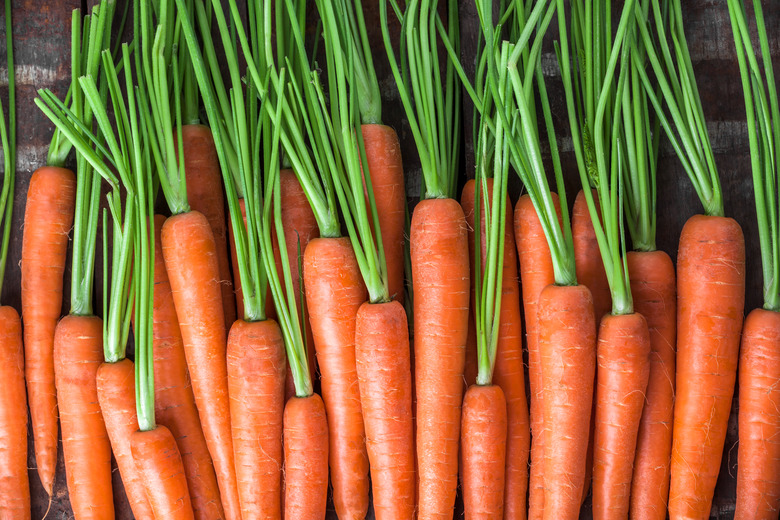What Happens After You Put A Carrot In Saltwater?
All living cells have a membrane that allows the free movement of water but restricts the movement of solutes dissolved in the water. This membrane allows the cells to assimilate nutrients and excrete waste. It's easy to observe the effects of this movement, which is called osmosis, by immersing a carrot in saltwater. Because the concentration of salt is higher outside the carrot's skin, the carrot's cells lose water, and the carrot shrivels.
TL;DR (Too Long; Didn't Read)
Putting a carrot in salty water will make it shrivel up, as water leaves the carrot's cells to enter the salty water — a process called osmosis.
Hypertonic and Hypotonic Osmosis
Hypertonic and Hypotonic Osmosis
Cell membranes are permeable to water, and in the absence of a solute on either side of a membrane, water will move one way as easily as it moves the other. If the outside of the membrane contains a solute, such as salt, the solution correspondingly contains fewer water molecules. To restore equilibrium — the same number of water molecules on both sides of the membrane — water flows from inside, and the cell shrinks. On the other hand, if the concentration of solute inside the membrane is greater, water flows into the cell and swells it. This is called osmosis.
A Carrot in Salty Water
A Carrot in Salty Water
The turgidity, or stiffness, of a carrot depends on the water content of its cells. When the cells are full of water, they grow large and are packed closely together, making the carrot turgid. Conversely, when the cells lose water, they shrink and the carrot shrivels. That's what happens when you put a carrot in salty water and leave it there. When the concentration of water molecules inside the cells matches that outside, the carrot stops shriveling, and when you remove it from the water and taste it, it has a stronger flavor because it contains less water.
Making Pickles and Preserving Food
Making Pickles and Preserving Food
Soaking cucumbers, carrots, peppers and other vegetables in brine is an ages-old way of storing them. The process is called pickling, and it preserves food by drawing water out of the cells and drying them out. The characteristic strong taste of pickles comes from the reduced amount of water on the cells and the resultant higher concentration of solutes, including salt. You don't have to immerse food in salty water to preserve it — a common way to preserve meat is to dust it with salt. When it's time to eat the meat, you just wash off the salt with water.
Saltwater and Freshwater Fish
Saltwater and Freshwater Fish
The bodies of marine creatures must compensate for the saltiness of the water around them. Those that live in the oceans must have a high concentration of salt to avoid being desiccated by the surrounding water. The bodies of freshwater creatures, on the other hand, have lower salt concentrations. That's the main reason why a saltwater fish can't survive in freshwater — it absorbs water and bloats. If, conversely, you put a freshwater fish in saltwater, it shrivels. Humans need freshwater to survive. If they drink saltwater, their cells dehydrate and they die.
Cite This Article
MLA
Deziel, Chris. "What Happens After You Put A Carrot In Saltwater?" sciencing.com, https://www.sciencing.com/happens-put-carrot-salt-water-8550119/. 27 April 2018.
APA
Deziel, Chris. (2018, April 27). What Happens After You Put A Carrot In Saltwater?. sciencing.com. Retrieved from https://www.sciencing.com/happens-put-carrot-salt-water-8550119/
Chicago
Deziel, Chris. What Happens After You Put A Carrot In Saltwater? last modified March 24, 2022. https://www.sciencing.com/happens-put-carrot-salt-water-8550119/
